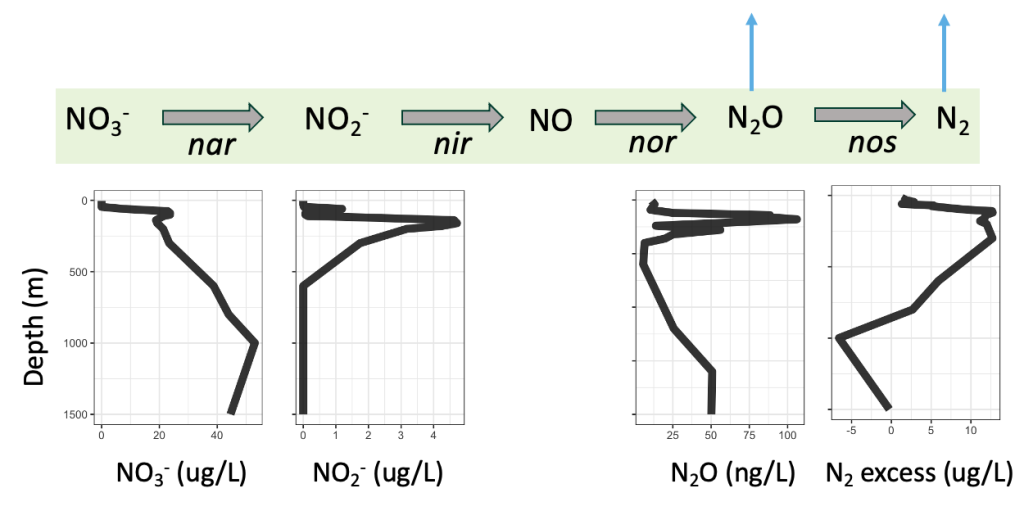Roles of Uncultured Microbes in the Nitrogen Cycle of Oxygen Deficient Zones
by Jordan Winter, UW Oceanography Graduate Student
Oxygen deficient zones (ODZs) are areas of the ocean with sluggish circulation that result in anoxic water columns hundreds of meters thick. These regions harbor many unique microbes and are expanding in depth and extent due to climate change. A common energy strategy for ODZ microbes is denitrification, which is the multi-step process of reducing nitrate to nitrogen gas. During this process, nitrous oxide can be produced. Nitrous oxide is a powerful greenhouse gas that is about 300 times as potent as carbon dioxide. Additionally, denitrification can result in nitrogen loss to the atmosphere.

Through the Graubard Fellowship, I have been able to dive deep into the world of Marinimicrobia, an abundant yet understudied phylum of bacteria with no marine cultures. Marinimicrobia are abundant in ODZs and based on the literature likely play an important role in the nitrogen cycle in these regions. Because most groups of Marinimicrobia have not been cultured, I use metagenomics to reconstruct their genomes and learn about their genetic potential. This involves collecting a bulk seawater sample, sequencing all the DNA, and piecing back which DNA is from which organism using bioinformatic tools. I have found that instead of leading to nitrous oxide production or nitrogen loss, it appears Marinimicrobia in the region transform nitrate into other biologically useable forms. This has implications for the nitrogen budget as ODZs continue to expand, increasing their habitat range. Marinimicrobia could be indirectly contributing to greenhouse gas production or nitrogen loss if the nitrogen they produce gets transformed by other microbes.
I have been able to tie my work more directly to climate change and explore an often-overlooked organism with the Graubard Fellowship. I have also been able to focus on nitrogen, a vital nutrient for life. Through PCC I have been able to talk with scientists outside my discipline about the work and create connections. In the future I plan on expanding my research to study other abundant microbes and elemental cycling processes in ODZs. I want to use bioinformatic tools to explore interdisciplinary topics and continue to expand our knowledge of uncultured microbes that often play a large role in extreme environments.
 Jordan is a 3rd year Ph.D. student in the School of Oceanography. She is also pursuing the Graduate Certificate in Climate Science. Her Ph.D. research is focused on microbes in oxygen deficient zones and their roles in biogeochemical cycling.
Jordan is a 3rd year Ph.D. student in the School of Oceanography. She is also pursuing the Graduate Certificate in Climate Science. Her Ph.D. research is focused on microbes in oxygen deficient zones and their roles in biogeochemical cycling.